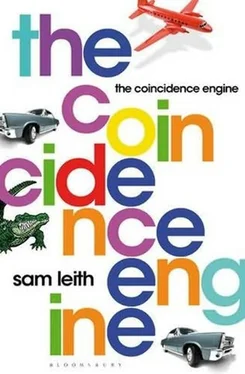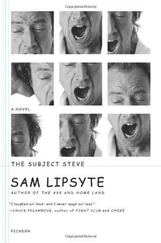There was a moment where it just hung there, and neither woman knew what to say.
‘But come in, of course. Come in. My goodness, were you there? Are you hurt – you poor thing…’
She reached a hand to the other woman’s arm, and saw her shoulder shrink back and her eyes drop. Her hand tightened round the thin green bag.
‘I’m very well, thank you. I’m sorry. I mean, I’m fine. I think they’ve gone – but my telephone isn’t working at the moment.’
Mrs Hollis’s tight politeness was as brittle as porcelain. If she touched her, she felt sure that she’d start to tremble and cry. She didn’t know quite how to cope with that, so she said: ‘Of course. Yes. I’ll put the kettle on.’
She made Mrs Hollis a cup of tea. Mary Hollis, who had not since she was a young woman and been told it was common taken sugar in her tea, had two lumps. Installed on the sofa, she sipped, and scalded her lips, looking around the living room with a bland show of curiosity.
The police showed up a little later. A man and a woman. She, a trim blonde in her early twenties; he, a thyroidal beanpole of a lad who looked barely out of his teens, and whose Adam’s apple bobbed up and down his neck like a fisherman’s float after a motorboat has passed.
The WPC called Mrs Hollis ‘dear’, which would have annoyed her had she been more composed. Her silent companion looked ahead, gulped and bobbed.
They went back into her house a little later. The interior of the house matched the wreckage in the hallway. Her single mattress had been heaved over and there were knife slashes through the fabric of the bed frame.
The little room she used for her study had received the most thorough going-over – books pulled from shelves and scattered open-faced on the floor; slicks of paper spilling from the disembowelled desk. She gasped, little fluttery gasps, as the woman officer asked her, patiently: what’s gone?
She didn’t know. The feeling wasn’t so much loss as violation. And there had not been that much to go, as she would reflect later sitting alone in her ruined room – she declined with a politeness she regretted Mrs Smart’s offer of a bed for the night. No. She couldn’t possibly.
Not that much. They’d left her radio, the old television set. They probably wouldn’t have recognised as valuable the fine old edition of Peter Pan that had been her mother’s, the one with the Rackham illustrations. It, too, had been flung to the ground. She replaced it on the shelf.
The jewellery box on her dressing table had been upturned, its contents scattered onto table and floor below. She fished the big turquoise-and-silver brooch from the carpet when the police left, put it carefully back into the box. She started tidying. Gathering these little precious things back together, amid the destruction of the room, felt like combing the hair on a corpse.
The knife slash through the fabric of the bed frame was especially horrible – a casual, instrumental violence. She imagined herself on the bed, on her back, the knife descending. The man with the knife looking not at her, but through her, towards something else.
‘You must have surprised them,’ the policewoman had said before she left, making a note in her pad.
Mary didn’t think she’d surprised them, still less scared them. Nobody had rushed past her or clattered in the bowels of the house as she opened the door. Nobody had hoofed it over the garden fence. They’d been here, and they’d not wanted her jewellery or her nice books or her television. They’d not cared what they broke.
She fingered the piece of paper the woman had given her – a form, something to do with being a victim of crime – and looked over again at the slash on the bed. Where the knife had hit the frame, the wood had splintered.
Mary had said nothing to the police about the man she thought she saw vanish. She wondered if she’d been hallucinating. She didn’t want them thinking her dotty. Downstairs, she picked up the cushions and replaced them on the sofa. She slept on there that night, still in her clothes.
Mary was right about that much. They had not been interested in her jewellery, the men who had turned over her house, and they would not have been scared of her. They had not, in fact, been interested in her house, her nice books, her jewellery, her television or anything else. They went by the names Davidoff and Sherman, and they had been intending, in fact, to burgle another house altogether.
But the small flat Mike Hollis lived in on the other side of Cambridge from his aunt was a sublet, and the address and phone number appeared in the book under his landlord’s name. So when discreet enquiries were made of Google by the accident-prone employees of MIC Industrial Futures, those enquiries yielded an M. Hollis in Glisson Road. And when those enquiries were cross-checked by the same accident-prone employees with the payroll system of Emmanuel College, Cambridge – a comically easy hack, they had thought – they confirmed ‘M. Hollis’ at that address, and in receipt of the sort of miserly monthly cheque that corresponded to their understanding of what research fellows in mathematics could be expected to earn. They were right about only one thing – research fellows in mathematics do earn about the same as a long-standing college administrator would expect to draw as a pension. But they are paid by the faculty of mathematics, and not by the college.
So, twenty-four hours after ruining Mary Hollis’s home and her peace of mind for no good reason, the two men were standing in a room that smelled of dry-cleaning and swivel chairs and paper plates of stale biscuits covered in cling film.
Davidoff stood with insolent blankness, big hands nested behind his back, chin up. His hair was sandy and his cheeks permanently windburned so he always looked as if he had just shaved with a blunt blade. Sherman was smaller – wire-haired, sallow, all muscle and nerve. He was like a longdog constructed from twisted rubber bands. They were making their report.
Their report was that they had nothing to report. In search of their employer’s fugitive piece of hardware, they had burgled a blameless old woman. On the evidence of her house she, also, knew no more about the device than you’d expect an elderly secretary to know. Then that old man had turned up. They’d no idea if he’d been a husband, a lodger, or what – he’d looked more like a tramp than anything else – but he had appeared as if from nowhere, and Sherman feared – though he did not tell Ellis this – that the guy had got a look at his face.
What had he been doing there? Everything had been quiet. No burglar alarm, no nothing. They’d watched the old woman leave earlier in the day, and lock the front door behind her.
It had given Sherman the fright of his life. The man had just appeared at the top of the stairs and started walking calmly down towards them. Sherman and Davidoff had bolted as soon as they’d seen him.
They had ‘struck out – nil for one’, as Davidoff, wearing his affected Americanism with an irritatingly complacent air, had put it on the way in. Davidoff seemed almost to relish failure; or perhaps he simply liked watching Ellis cross. What was being handed down to MIC’s head of security was, it was reasonable to speculate, about three times as nasty as what he was capable of passing on to those below him.
‘Gentlemen,’ said Ellis, which was his customary overture to a bollocking. He thought it made him sound superior. ‘Gentlemen, I don’t need to remind you that a very great deal of this company’s time and money is invested in the recovery of this device. And I don’t need to remind you, either, that if it falls into the wrong hands – that is, any hands other than our own – my position is going to look very weak indeed.
Читать дальше












